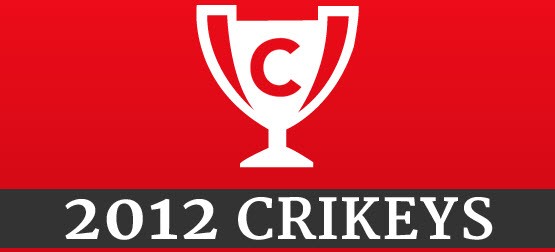It was a year of media inquiries, interspersed with bouts of media sackings. When we weren’t making people redundant or planning new ways of regulating the press, we were busy being appalled by the latest case of media depravity.
In 2012 we saw the press shrivel and we finally realised it will no doubt wither. Online media continued to assert itself and social media returned us to the days of mob rule. Establishment media often had no defence against waves of progressive media consumers. Apps collapsed, start-ups folded and paywalls rose and fell.
Against that backdrop, we offer the 2012 Crikeys for media excellence and mediocrity …
Newspaper of the year: The Canberra Times (by default)
It’s very hard to pick this year. Very hard indeed. Not because lots of newspapers stood out but because none of them did. We can’t give it to The Australian Financial Review because the paper just seems so erratic under editor Michael Stutchbury. We can’t give it to The Age or The Sydney Morning Herald because this is the year that both of those papers became shadows of their former selves, although it has to be said The Age managed to churn out some good investigations and the SMH offered up some decent political reportage.
We can’t give it to the News Limited metropolitan tabloids because they’re all seemingly in editorial lockstep. We can’t give it to The Australian because … well … it’s The Australian. Meanwhile, The West Australian ruled itself ineligible by opting out of the Press Council. That doesn’t leave us much. Maybe The Canberra Times? God, if only we had some real press diversity …
Broadcast television program of the year: Go Back To Where You Came From
SBS’ fantastic Go Back To Where You Came From did what most of the rest of the media failed to do: made an effort to explain the reasons behind the arrival of boat people in Australia. It didn’t demonise anyone (although Catherine Deveny did her best with Peter Reith). Instead it helped us understand the issue. Fancy that, something in the media that takes the time to shed light on a complex topic?
Best editor/producer: Sally Neighbour
Given our lamentations about the state of newspapers we just couldn’t bring ourselves to award an editor this year. We are aware this will cause considerable distress among the editing fraternity. Instead, we’ve broadened the category to include TV current affairs programs.
Any suggestion we did this just so that we could give the award to Sally Neighbour, executive producer of the ABC’s 7.30, is completely true. But why not? Neighbour has revitalised the program, put greater emphasis on investigations and given it much greater currency. And with Leigh Sales’ fine interviewing, it was often must-watch TV.
Best commentator of the year: Ross Gittins / David Penberthy
Laura Tingle in the Financial Review often managed to be erudite. George Megalogenis gave us commentary on some of the most obscure data generated by the ABS and the Tax Office and somehow, in the process, helped us see big truths more clearly. Although, I suspect most of us promptly forgot the detail.
Ross Gittins continued to cut through all the verbiage of the media with his often cogent analysis at Fairfax. And News Limited’s David Penberthy occasionally surprised us on The Punch with wit and insight. We’ll let them chose the winner between them. I’m sure they’ll come to an amicable arrangement. It’s not as if any of them have strong opinions or anything …
Most constructive media campaign of the year: Victorian cancer clusters
Well done to the Herald Sun‘s Ruth Lamperd for her campaign on cancer clusters at Country Fire Authority training facilities. Dogged reporting, backed by her editors. Pretty impressive really.
Weirdest media campaign of the year: anti-media regulation
Again, hard to pick. There was that strange anti-trolls campaign in The Daily Telegraph and that odd one on power prices, in which the financial motives of the sponsors were obscured in all the hype about saving money on energy bills. It started to look like a recruitment campaign for a cult. Then there were those forget-about-the-nuance campaigns by The Australian. And we’re not just talking about the rabid attacks on Julia Gillard over the AWU slush fund. There was the one aimed at journalism educators, which seemed to have the hand of editor-in-chief Chris Mitchell on it.
But the winner has to be News Limited’s campaign against anything that looked like regulation of the press. It was led by News Limited CEO Kim Williams, who routinely warned of the impending mass-imprisonment awaiting the nation’s reporters and of the inevitable slide towards Stalinism because of whatever media inquiry was handing down its findings that week.
The best story you never read: RBA Securency stories
I don’t mean to be rude, but aren’t newspapers meant to be written for intelligent 12-year-olds? My hunch is Neil Chenoweth’s series (and book) on pay TV piracy was written primarily for pay TV technicians. It was a great yarn though. I think. Likewise, Nick McKenzie and Richard Baker’s Securency stories in The Age — they had real significance and were rightfully regarded as important. Don’t test me on the detail but I do know that knowing when the RBA governor Glenn Stevens knew something was really worth knowing.
Puff piece of the year: The Oz on Noel Pearson
Caroline Overington’s profile of Noel Pearson landed in The Australian in August — the same day as Jane Cadzow’s piece about Noel Pearson was published in Fairfax’s Good Weekend magazine. Was The Oz piece a spoiler, designed to undermine the Fairfax profile? It certainly seemed that way. Was The Australian‘s profile soft and gentle? It certainly seemed that way. Next year we intend to create a new category: best puffy spoiler.
Worst news judgement: Hinch and Jones as news
It was reported during the year Derryn Hinch had been sacked by Melbourne radio station 3AW. We respectfully contend this shows appalling news judgement. It would have been news if Derryn had not been sacked. You might recall broadcaster Alan Jones committed a small indiscretion during the year when he claimed the PM’s dad had died of shame. Booooring. The day Jones is not an obnoxious, abusive loud mouth will be truly newsworthy. Until then, can’t we just ignore him?
I’m reliably told that a commercial radio station somewhere in Australia managed to play all of its scheduled advertisements for a whole day and even earned the whole 24 hours worth of revenue without withdrawing a single promotion to appease hordes of pissed-off social media activists. Now why wasn’t that reported?
Worst prank call
Errr …
Least effective social media campaign
We’ve had an email from Joseph Kony with some suggestions for this category.
Best apology: The Oz on the fund
Oh so many to chose from. Even Media Watch‘s Jonathan Holmes was in contention this year. There was Mark Day’s piece in The Australian that got several things wrong about the Convergence Review before it was released. There was the story by Janet Albrechtsen that wrongfully contended the Finkelstein inquiry would propose licensing of the press.
But that little story in The Oz in August, during the battle over the AWU affair, was probably the most damaging as the paper had to admit it had got the terms “slush fund” and “trust fund” confused. That tiny error shifted the momentum, allowing the Prime Minister to begin fighting back.









Today’s press council ruling on the Australian is a goodie. That mob is as mad as the subjects interviewed for the story:
http://www.theaustralian.com.au/news/nation/press-council-adjudication/story-e6frg6nf-1226540387906
You can’t give it to The Australian ……. because it’s for “newspapers”?
Love you work Andrew 🙂
It’s a said sign of how the Fin has fallen that a paid ad by the Chinese Government is offered as editorial as a promo on page one and on its web site.
I am getting pissed off by the News Ltd bagging the ABC. The ABC is already a of shoot of Sky News with the same morons talking to each other with Henderson and Ackerman thrown in. Now they are bagging a discussion on Conservative women In Kitchen Cabinet. This is an orchestration of opinion to ruffle Mark Scott in an election year and because News Ltd is loosing audience to the ABC. This is a standard News Ltd tactic they deployed against the Guardian for example when it started to blow the whistle on the Phone Tapping affair. These letters to the editor are contrived. I also want to know if the Insiders pays an appearance fee with my (taxpayer ) money.